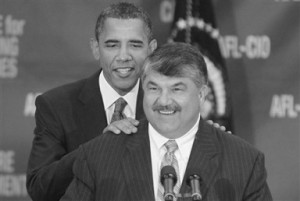Is This Any Way to Run a City’s Schools?
Leaked CTU Proposals Won’t Do Anything to Improve Schools’ Poor Performance

National Right to Work Committee members and supporters are now tantalizingly close to securing a major legislative victory that seemed like a near impossibility when the 2009-2010 U.S. Congress convened 21 months ago.
At the end of September, Congress adjourned without having rammed through the top power grab on government union bosses’ agenda this year, the so-called “Public Safety Employer-Employee Cooperation Act.”
If union lobbyists also fail to get this scheme (introduced as S.1611 and S.3194 in the upper chamber and H.R.413 in the lower) rubber-stamped in a post-election “lame duck” session, Committee members and supporters nationwide will deserve the lion’s share of the credit for a remarkable accomplishment.
At the beginning of 2009, well over 60 of the 100 senators and roughly 70% of House members were on the record in support of this legislation. President Obama was publicly vowing to sign it as soon as it reached his desk.
The only possible hope of blocking the government union power grab in the 2009-2010 Congress was a Senate filibuster — and mustering the 41 votes needed to sustain one seemed to be a long shot at best.
Nevertheless, from the beginning, Committee members and supporters have been ready to fight to the hilt, because the stakes are so high.

S.1611/S.3194/H.R.413, referred to unofficially, but accurately, as the Police/Fire Monopoly-Bargaining Bill, would empower Federal Labor Relations Authority (FLRA) bureaucrats to survey all 50 states and identify which have failed to meet the legislation’s “core standards.”
And the key “core standard” is mandatory union monopoly bargaining. Localities in all 50 states would be denied the option to refuse to grant a single public-safety union the power to speak for all front-line employees, including those who don’t want to join.
Monopoly bargaining, euphemistically labeled as “exclusive representation,” would be foisted on police, firefighters, and other public-safety employees nationwide. And in most states that already authorize public-safety monopoly bargaining, this legislation would widen its scope.
As Wall Street Journal reporter Kris Maher noted late this spring, under S.1611/S.3194/H.R.413, if any state refused to institute monopoly bargaining and comply with other mandates, FLRA bureaucrats “would step in and implement” them themselves.
This April, Senate Majority Leader Harry Reid (D-Nev.) signaled his determination to see this legislation enacted by introducing it himself as S.3194, a bill he could bring to the floor at any time, without any preliminary committee action.
A wide range of political observers, including the liberal Washington Post and the conservative National Review, blasted the Reid bill as a budget busting power grab.
“What this bill would do,” charged the Post’s editors, “is impose a permanent, one-size-fits-all federal solution in an area — public-sector labor relations — that has traditionally been left to the states, and where state flexibility is probably more necessary than ever. . . . The bill further empowers an already strong lobby . . . .”
The editors of National Review (online edition) were even more forthright:
“Government employees’ unions already maintain a death grip on the finances of most state and local governments, and a remarkably bad piece of legislation — the Public Safety Employer-Employee Cooperation Act — threatens to tighten that stranglehold . . . .”
Harry Reid Nearly Succeeded Because of GOP Collaborators
Of course, the fact that liberal, conservative and moderate analysts recognized S.3194 as bad in principle and extraordinarily ill-timed didn’t trouble Mr. Reid.

The bottom line for him is that the legislation would empower and enrich union officials who are one the Democratic Party’s “most important constituencies,” as National Review’s editors put it.
However, Democrat politicians, despite controlling the White House and substantial majorities in both chambers of Congress, weren’t in a position this year to make the Police/Fire Monopoly-Bargaining Bill, in any of its versions, the law of the land all on their own.
Since GOP Sen. Scott Brown (Mass.) took office in February, there have never been more than 59 senators in Mr. Reid’s majority caucus. But it takes 60 to bring up a piece of legislation for a final vote if opponents seek to block it by launching an extended debate.
The reason Mr. Reid nearly succeeded this summer in making his pet scheme the law of the land was because six out of the 41 GOP senators were sponsoring S.1611, monopoly-bargaining legislation virtually identical to the Reid bill.
All-Out Right to Work Mobilization Stalled Union Lobbying Blitz
On July 1, the House monopoly-bargaining legislation sailed through the lower chamber as a provision of H.R.4899, a massive, unrelated defense spending bill. Union strategists eagerly anticipated the Senate passing the whole measure later that month.
But then, for several weeks in July, freedom-loving Americans mobilized by the National Right to Work Committee contacted their senators again and again, urging them to oppose H.R.4899 on all votes unless and until the public-safety union monopoly-bargaining amendment was removed.
Several organizations representing the interests of local governments and public-safety departments, such as the National Sheriffs’ Association, joined with the Committee in lobbying against the forced-unionism sneak play.
The message clearly got through to a number of senators who normally vote with Big Labor, but were getting antsier and antsier about their next election.
On the evening of July 22, the Senate voted down the House-passed version of H.R.4899, and then approved a war spending bill without the monopoly-bargaining provision. Finally, on July 27, a chastened House acquiesced to the Senate’s action, and sent a stripped-down war supplemental to President Obama’s desk.
Right to Work Supporters Have Continued Turning up the Pressure, Month After Month
The following month, voters in Alaska sent a clear message that politicians who face potentially competitive primary or general-election campaigns ought to be deeply concerned about backing the Police/Fire Monopoly-Bargaining Bill.
On August 22, 100% pro-Right to Work challenger Joe Miller dumbfounded most political pundits when he defeated Alaska Sen. Lisa Murkowski, the only GOP sponsor of S.1611 seeking re-election this year, by roughly 2000 votes, out of a total of fewer than 110,000 cast in the primary.
During the final weeks before the vote, the Committee put the spotlight on Ms. Murkowski’s pro-union monopoly stance by repeatedly contacting roughly 30,000 targeted households. TV ads, “snail” mail, and e-mail messages urged Alaskans to ask the senator to change her stand on S.1611.
Thousands of Alaskans complied, but Ms. Murkowski never repudiated her support for expanding government union bosses’ monopoly-bargaining privileges. She is now striving to retain her seat in a quixotic “write-in” campaign.
Just last month, yet another pro-union monopoly politician suffered a surprise defeat in Delaware’s “open seat” Senate primary. Republican Congressman Mike Castle, widely regarded as “popular,” endured a 3500-vote primary loss to his underdog rival, unabashed Right to Work supporter Christine O’Donnell. This summer, Mr. Castle had voted for H.R.413 as part of H.R.4899.
In Delaware, as in Alaska, the Committee had demonstrated Mr. Castle’s pro-forced unionism record was a cutting issue by repeatedly contacting 30,000 targeted households to alert them about the congressman’s vote for H.R.413, and also for similar legislation in 2007.
“Potentially vulnerable senators whose seats are up in 2012 or 2014, and are considering helping government union barons sneak through the Reid bill in the ‘lame duck’ session beginning next month, should consider what happened to Lisa Murkowski and Mike Castle,” commented Committee President Mark Mix.
“And they should avoid playing with fire.”

Leaked CTU Proposals Won’t Do Anything to Improve Schools’ Poor Performance

Wherever Big Labor wields the power to collect forced union dues, union bosses funnel a large share of the confiscated money into efforts to elect and reelect business-bashing politicians. Employment growth tends to lag as a consequence.

Members Insist They Keep Pro-Right to Work Campaign Promises